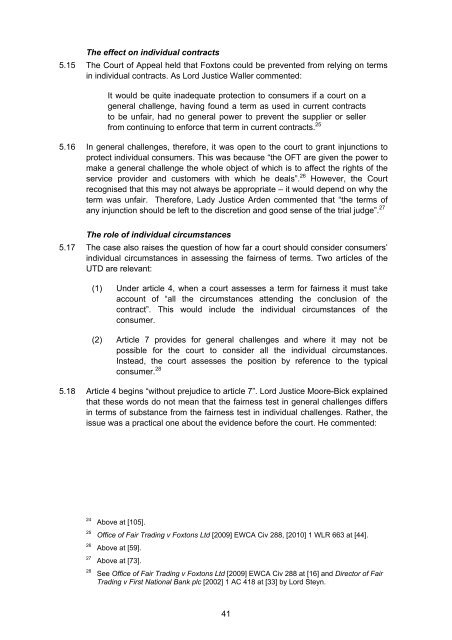Unfair Terms in Consumer Contracts: a new ... - Law Commission
Unfair Terms in Consumer Contracts: a new ... - Law Commission
Unfair Terms in Consumer Contracts: a new ... - Law Commission
You also want an ePaper? Increase the reach of your titles
YUMPU automatically turns print PDFs into web optimized ePapers that Google loves.
The effect on <strong>in</strong>dividual contracts<br />
5.15 The Court of Appeal held that Foxtons could be prevented from rely<strong>in</strong>g on terms<br />
<strong>in</strong> <strong>in</strong>dividual contracts. As Lord Justice Waller commented:<br />
It would be quite <strong>in</strong>adequate protection to consumers if a court on a<br />
general challenge, hav<strong>in</strong>g found a term as used <strong>in</strong> current contracts<br />
to be unfair, had no general power to prevent the supplier or seller<br />
from cont<strong>in</strong>u<strong>in</strong>g to enforce that term <strong>in</strong> current contracts. 25<br />
5.16 In general challenges, therefore, it was open to the court to grant <strong>in</strong>junctions to<br />
protect <strong>in</strong>dividual consumers. This was because “the OFT are given the power to<br />
make a general challenge the whole object of which is to affect the rights of the<br />
service provider and customers with which he deals”. 26 However, the Court<br />
recognised that this may not always be appropriate – it would depend on why the<br />
term was unfair. Therefore, Lady Justice Arden commented that “the terms of<br />
any <strong>in</strong>junction should be left to the discretion and good sense of the trial judge”. 27<br />
The role of <strong>in</strong>dividual circumstances<br />
5.17 The case also raises the question of how far a court should consider consumers’<br />
<strong>in</strong>dividual circumstances <strong>in</strong> assess<strong>in</strong>g the fairness of terms. Two articles of the<br />
UTD are relevant:<br />
(1) Under article 4, when a court assesses a term for fairness it must take<br />
account of “all the circumstances attend<strong>in</strong>g the conclusion of the<br />
contract”. This would <strong>in</strong>clude the <strong>in</strong>dividual circumstances of the<br />
consumer.<br />
(2) Article 7 provides for general challenges and where it may not be<br />
possible for the court to consider all the <strong>in</strong>dividual circumstances.<br />
Instead, the court assesses the position by reference to the typical<br />
consumer. 28<br />
5.18 Article 4 beg<strong>in</strong>s “without prejudice to article 7”. Lord Justice Moore-Bick expla<strong>in</strong>ed<br />
that these words do not mean that the fairness test <strong>in</strong> general challenges differs<br />
<strong>in</strong> terms of substance from the fairness test <strong>in</strong> <strong>in</strong>dividual challenges. Rather, the<br />
issue was a practical one about the evidence before the court. He commented:<br />
24 Above at [105].<br />
25 Office of Fair Trad<strong>in</strong>g v Foxtons Ltd [2009] EWCA Civ 288, [2010] 1 WLR 663 at [44].<br />
26 Above at [59].<br />
27 Above at [73].<br />
28 See Office of Fair Trad<strong>in</strong>g v Foxtons Ltd [2009] EWCA Civ 288 at [16] and Director of Fair<br />
Trad<strong>in</strong>g v First National Bank plc [2002] 1 AC 418 at [33] by Lord Steyn.<br />
41

















